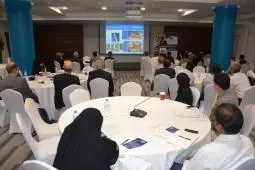PHOTO
Abu Dhabi, 13 November 2016
The Petroleum Institute announced today the conclusion of a two-day event organized in cooperation with the EU-GCC Clean Energy Network and in association with ADNOC, the Masdar Institute of Science and Technology, and the Clean Energy Business Council. The event convened on November 8 prominent clean energy experts for the Network’s Working Groups on carbon capture and storage (CCS) and clean gas. The Working Groups meetings included presentations and interactions with experts from ADNOC ENP, ECN, GASCO, Masdar Institute, Petroleum Development Oman, The Petroleum Institute, Total EP, and UAE University. The event continued on November 9 with a training workshop on energy efficiency and renewable energy applications for the oil and gas industry, which hosted fruitful contributions from experts from ENERWHERE, IRENA, Qamar Energy and Shell.
According to the International Energy Agency, CCS could contribute approximately 14% of total energy-related carbon dioxide (CO2) emissions by 2050. In this context, attendees of the two-day event discussed opportunities and strategies to advance the technology to help the UAE reduce its emissions by 15% by 2021.
Commenting on the workshops, Dr. Marc Durandeau, senior vice president – research and development for the Petroleum Institute, said: “The GCC region has vast potential to develop renewable energy that can be used to accelerate the shift toward a ‘green economy.’ The Petroleum Institute is playing a key role in achieving the UAE’s vision and transition to a knowledge economy by advancing research facilities and techniques, partnering with international institutions and fostering innovation in research.”
“This week the Paris Agreement went into force, which aims to keep global warming below 2°C, ideally below 1.5°C. Carbon capture and storage, as well as more efficient use of natural gas are key technology areas toward achieving that goal. The combined efforts of The Petroleum Institute, the EU-GCC Clean Energy Network and other stakeholders to understand where science and technology can take us, is crucial to ensuring our sustainable development,” said Frank Wouters, Director, EU-GCC Clean Energy Network.
“The workshop provides a great opportunity to learn from others and to refocus the research agenda toward enabling carbon capture and storage at a scale 20 to 50 times larger per storage project than has been achieved in the last two decades,” said Dr. Martin Jagger, career coordinator at ADNOC ENP.
Commenting on the workshop, Dr. Mohamed Abu Zahra, head of the chemical and environmental engineering department at the Masdar Institute, said: “This workshop serves as a good opportunity to discuss potential collaboration between EU and GCC countries in the area of carbon capture, utilization and storage (CCUS) technologies. The workshop coincides with the opening of the large-scale CCUS project in Abu Dhabi jointly operated by Masdar and ADNOC.”
-Ends-
About The Petroleum Institute
The Petroleum Institute University and Research Center (PI) was established in Abu Dhabi, the capital of the United Arab Emirates in 2001 with a goal of becoming a world-class institution in both engineering education and energy industry research. PI currently has more than 2000 undergraduate and graduate students, over 200 faculty, and has become a leading teaching and research institution in the Middle East. The PI’s sponsors and affiliates include the Abu Dhabi National Oil Company (ADNOC) and four major international oil companies; BP, Japan Oil Development Company (JODCO), Shell and Total. The campus has modern instructional laboratories and classroom facilities and now hosts a state-of-the-art research center, the PI Research Center (PIRC), which began operation in July 2016 and will be inaugurated in December 2016.
About the EU GCC Clean Energy Network
The EU– GCC Clean Energy Network was created as a response to the interest in the EU and in the GCC for cooperation on clean energy matters. The Network, which is being funded by the European Union, focuses its activities on five areas, namely renewables, energy demand-side management & energy efficiency, clean natural gas, electricity interconnections, and carbon capture & storage.
The overall objective of the Network is to enhance EU-GCC energy relations by joint initiatives for cooperation of mutual interests in the area of clean energy technologies, including through joint initiatives such as workshops, roundtables, exchanges of expertise and best practice training and seminars.
© Press Release 2016




















